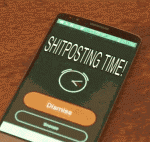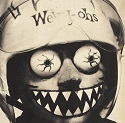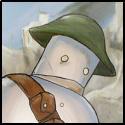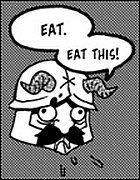|
Objectively I think it's fair to say that Kwasimodick's stories are far more entertaining than 50 Foot Ant's in way less words. (Quoting as it was at the end of the last page) Kwasimodick posted:Home Chimes
|
|
|
|

|
| # ? May 30, 2024 00:34 |
|
Kwasimodick posted:dangling from his groin was a tiny, golden bean, with a street value of approximately 1 million US dollars. Please, somebody explain this to me - which part of the story did I miss that makes this a coherent thing? What is the author trying to tell us?
|
|
|
|
sebmojo posted:I sense there are subtleties in the mise-en-scene we've still to explore.
|
|
|
|
The bean represents patriarchy.
|
|
|
|
$1,000,000 in gold would weigh about 50 pounds. There's no way you could compress that into a groin-bean.
|
|
|
|
That gradually got more and more uncomfortable until the bean line. I thought it was funny. So I'm new to this thread. I've been writing a lot of these things that I initially started as prose poems, which gradually got longer, almost a full page. I figured they would constitute some form of micro-fiction something. Since they all started out as explorations of small moments or scenes, I don't think they would merit a full short story. I lifted this scenario partially from something else, but I'm not saying what. quote:
|
|
|
|
Thank you very much to both Amtiskaw and inthesto for your in depth critiques. Truly, much appreciated. Amtiskaw - I'm glad you like the ideas. That's a good start. The vagueness and wishy-washy may very well come from this snippet being unsupported by the extensive background of the story I have in mind. The numbered list you provided is a great focus. Thanks a lot! I hope to answer all the questions along the way. I think you're right about figuring out the rules of the world in more detail, though. You're absolutely right about the tense switching problem! I know that's one of my biggest issues that I'm still working on, so I especially appreciate when readers point out exactly where they mistakes are. As for the overly conversational narrative tone, I didn't realize I did that until you and inthesto pointed it out. Definitely something worth working on. Thanks for the book recommendation! I'll have to check it out.
|
|
|
|
neonnoodle posted:$1,000,000 in gold would weigh about 50 pounds. sebmojo posted:A one inch ball (lol) of 24 karat gold weighs a bit less than six ounces, not including cockring/ball fittings. An ounce of gold is $USD1300. So we're looking at a value, on the damned, mean, dirty, cold-rear end streets, of around $8k. We need to go bigger. Personally, I like the Wheaten Terrier the best. Kwasimodick is a new CC treasure in my opinion. neonnoodle, please consider making him/her/it co-mod of CC, thanks for the consideration.
|
|
|
|
Hey guys, I could use a fresh set of eyes to do a quick look over my prose. It's 1200 words, and I understand if you don't want to read it, but if you do read it, let me hear your thoughts? I enabled comment making to make it easier for you guys. I just want to make sure I'm not sliding back into bad habits. Heading off to work to not think about it for a few hours before I edit again tonight, but your critiques are always welcome - it helps me out tremendously. Mercedes fucked around with this message at 19:56 on Oct 10, 2013 |
|
|
|
Mercedes posted:Hey guys, I could use a fresh set of eyes to do a quick look over my prose. I've never posted in this thread before, but I've taken a few creative writing classes and decided to look over your writing. I made several comments in the document you posted. I'm not familiar with your prose, so I have no idea what your typical "bad habits" are, but what I see is way too much tell and not enough show. It's all exposition exposition exposition with very little sensory detail to make the story come alive. I highlighted a few examples of it in your work but not all. If you're interested, I can point out more places that could use action and image instead of explanation. I also provided a couple examples of how to rewrite something I highlighted as showing instead of telling. The biggest issue I have with this is the sudden, jarring change to the second person near the end. That whole section feels awkward to read. Really, it's awkward to read a story in the second person at all, let alone a mixed perspective story, and is a strange way to write and hard to do successfully, in my opinion.
|
|
|
|
Hey thanks for taking the time to look at it. To answer a few of your questions, the prose is from a CYOA I'm running in the forums. The prose is supposed to be in first person to give a tabletop rpg feel. I caught the mistake earlier and I did change it. Again, thanks for the crits
|
|
|
|
Here again (148 Words) The clatter of the crowded restaurant fades, as I find myself in a familiar place and time. A door lodged into a tall wedge of a building, standing between a placid river, embedded in concrete. To the right - a secret bamboo grove. The road is worn and uneven. Pausing on my bicycle, the summer heat waning in the failing light. The air still heavy and motionless. It smells of nothing. Recessed into the entrance a slender vending machine hums quietly, chilling its meager selection of beverages. It feels alien. Warm light spills quietly out of the frosted window - onto concrete steps below. There is indistinct chatter coming through the other side. Being part of it would mean everything. The desire to step trough the doorway condenses the entire scene to a brilliant single point, the door becoming achingly real, again. And then, without warning, it fades. I never entered. VomitOnLino fucked around with this message at 06:03 on Nov 1, 2013 |
|
|
|
VomitOnLino posted:Here again (148 Words) Okay, this is pretty bad. You're trying to be very pared down and poetic without the control to really pull it off. I suggest a round or two of Thunderdome to get this tendency beaten out of you. Otherwise, give me this story in 1000 words not 200.
|
|
|
|
sebmojo posted:Okay, this is pretty bad. You're trying to be very pared down and poetic without the control to really pull it off. I suggest a round or two of Thunderdome to get this tendency beaten out of you. Otherwise, give me this story in 1000 words not 200. Thanks for the critique, I needed that. I guess, as I don't write very often, I should take my time instead of throwing half-cooked stuff around. Cheers.
|
|
|
|
VomitOnLino posted:Thanks for the critique, I needed that. Nah, bullshit. Don't wait until it's perfect because it never will be. Crank it out man. The more the better. Join Thunderdome and you'll have a weekly crit enema.
|
|
|
|
sebmojo posted:Nah, bullshit. Don't wait until it's perfect because it never will be. Crank it out man. The more the better. Join Thunderdome and you'll have a weekly crit enema. Do this!
|
|
|
|
VomitOnLino posted:Here again (148 Words) You've done a great job setting a very confusing scene. As I read this over for the fifth time, I think I get that you're describing someone waiting outside a restaurant with his or her bike, on a summer evening, wanting to go inside but being afraid to because of social anxiety or some reason. Is that what you were going for? For a story this short, you're spending way too many words on the setting, and the description of the setting is disjointed and confusing to boot. There isn't much of a discernible plot here, either. It's just "guy or girl again stands scared in doorway of a restaurant they long to visit for an unknown reason and never goes inside." That's a description not a story. Why is this person afraid to go inside? What triggered this fear? What is going through their mind as they look inside? Why is this particular place so appealing over other places? Is it just this restaurant he or she won't go in or is it any place with crowds? How can this character change or grow through this scene/story? Personally, I think this work would be far more interesting if this was the moment something changed and the narrator went in the restaurant. Otherwise, in my opinion, what you've written might serve better as a scene that helps develop this character's personality in a longer story and not a stand alone piece. If you want to keep the story at this approximate length, you need to tighten it up significantly, remove much of the setting descriptions you've provided, clarify what is going on, and give it a plot. Make every single word count. I also second Sebmojo's line edits about word usage and unnecessary details.
|
|
|
|
I tried to come up with something to say about Here Again, but I think violet dragon et al have covered it. I'll gladly review the next piece or two posted. Here's mine: Winter 1939 When I was a child, I had my own kingdom. My grandparents owned some acreage on Higgins Lane, just a few miles from my home. A large, rushing creek cut through the property, isolating a tiny corner against a barbed-wire fence. Trees and brush grew in a wall on both sides of the creek, hiding the land behind from prying eyes in the house. Through an arched gap in the trees, a small, aging wooden bridge crossed the creek. This triangle of land - barely a half-acre - was mine. Here, I could be myself, alone. Not alone like with a book, curled up in my room. Books draw you inward; each page grows inside your imagination, like a plant in the soil of your mind. Behind the trees and across the bridge, I could let loose upon the world the garden of my imagination. It poured out and filled that space like an overflowing sink. In one corner, an alien world waited to be explored; in another, a homestead stood against the wilderness; in the third a squad of brave soldiers needed a leader. My imagination could expand into other places, of course, but only little bits at a time. My bunk bed was a spaceship in unexplored territory, or the farm buildings a country town to defend from bandits and raiders, but those belonged to other people, carried other spirits. The only things across the creek were me, and those things I brought with me across the bridge. In that place, there were no clocks; only the tyrannical sun could call me back. While the sun stayed in the sky, it was my world. At night, I imagined that the monsters came out, all of my nightmares come to life. After each long day, as the sun threatened to set behind the mountains, I reticently shuffled inside. My fear of the monsters always won over my curiosity - but some evenings just barely. From time to time, my grandfather would appear on the other side of the bridge, to check that I was safe or call me back for meals. In my child's mind, I knew that he couldn't cross that bridge. No one could, except me. Each season, the bridge fell apart bit by bit. Boards dropped out, and those that didn't would rot from winters and the perpetual moisture of the creek. One year I knocked a hornet's nest into the rushing water - I was rather proud of that. When I was twelve, my grandmother forbade me from crossing any more. I took one last look through the archway of foliage, and turned away. The doors of my kingdom were sealed shut. - In my twentieth year, my grandmother died. The house was full of family - aunts, uncles, cousins, and beyond, all pressing against the walls, inflating the house with their grief. I walked along the creek in the January chill, my feet crunching in the snow. A rush of nostalgia stopped me where the brush and trees parted. The skeletal remains of the bridge were still there: two supports, thin with age and weather, and a handful of crossmembers. All but one of the boards were askance; snow and frost covered the grey wood. I looked up; through the brush, I glimpsed a girl dancing in a circle in the snow. She wore a simple flannel dress, a thick wool coat, and leather boots just a bit too big. The girl's short brown curls bounced, framing her blissful smile and bright eyes. I felt I recognized her, but couldn't put my finger on it. Memories of my years behind the creek rushed back. The last time I had seen it, the bridge had looked intimidating, impossible. As an adult, I could see a way across. The girl fell into the snow, her arms and feet moving back and forth. Giggles of delight carried across the water. I placed one foot on the support, then another on a skewed, rotted board. Another step, onto the straight board, and then one more brought me halfway across. I saw the girl get up and bounce away behind the brush. I wondered why she hadn’t seen me yet. With a crack like a gunshot, the support gave way. I fell sideways, the ice breaking like thin glass. My skin screamed as I sank into the water, my muscles paralyzed by shock and cold. Breathing didn't even enter into my mind until it was too late. My entire body was numb, and my mind and soul were following closely behind. Suddenly, I launched upward, out of the ice and into the brush on the shore. My eyes snapped open, blurred by the icy water. Knees deep in the creek was my grandfather. His face was stern; he said nothing as he helped me up and guided me back into the house. As we walked back, he turned and looked back beyond the creek and smiled. - A few summers later, I traveled back to the house. My grandfather and I spent a month in hip waders, rebuilding the bridge - properly, so it would last a decade or more. From their kitchen, I watch my children run across that bridge. From time to time, I check on them, poking my head through the brush and calling their names. In my adult mind, I know that I can no longer cross that bridge. It's their kingdom now. Once I know that they are safe, I head back to the house. In the hallway, there's an old, fading photograph of a smiling little girl in a flannel dress and boots that are a bit too big. On the back, in perfect cursive, is written my grandmother's name, and "Winter 1939."
|
|
|
|
I think your prose is decent and you have some obvious talent which shines through. Also as someone who spent a lot of time at my grandparent's cottage playing in empty lots by myself I couldn't help but get a bit nostalgic. That having been said you're writing gets a bit cumbersome as the piece goes on. Practically every sentence has some kind of flowery description or purple metaphor in it and after a certain point that starts to bog the flow of the piece down. For instance I'm not sure why you felt you had to describe what its like to read a book while you were in the middle of describing this half-acre of land that your protagonist liked to play in. In other cases you've included adjectives that don't need to be there. I think your better written passages would shine more clearly if you cut some of the weaker or more superfluous ones. Don't be afraid to have some simple sentences thrown in there. By way of example, this paragraph: quote:With a crack like a gunshot, the support gave way. I fell sideways, the ice breaking like thin glass. My skin screamed as I sank into the water, my muscles paralyzed by shock and cold. Breathing didn't even enter into my mind until it was too late. My entire body was numb, and my mind and soul were following closely behind. really doesn't work for me. Too many unnecessary adjectives and unnecessary similes. Also breathing is a reflexive act, its not something people have to think about usually so I think you need a new way to communicate how jarring and sudden his falling into the water feels. In terms of plotting I also think you could start setting up the actual dramatic incident (the protagonist apparently seeing the ghost of his grandma and then falling into the water). By the end the piece feels like its meandering. I gather that you're going for this general connection between the protagonist, his grandma and his kids, but in practice it sorta feels like you have two stories here, one about this childhood playing area and a second one about seeing your grandma's ghost. Right at the end of your piece there's a jarring change in tenses. I don't know if that was an intentional decision that is supposed to highlight that you're transitioning from a reminiscence of the past toward the present, but it just comes off as sloppy. Write everything in either present or past tense but don't randomly switch midway through a paragraph. Finally, when you titled your piece 'Winter 1939' I immediately thought of World War II (which began on September 2nd 1939). It felt a bit like a set-up with no payoff. Was there some reason you picked this date or was it coincidence?
|
|
|
|
Thanks for the feedback! Amusingly enough, I added most of that flowery prose on my rewrite because the piece felt stark to me. I can definitely revert to the previous mode. Thanks for the feedback about that paragraph; I'll have to rework it and see what I think. There are several themes I am working with, and I suppose that's part of my issue. I'll do another pass over it and try to tighten up the journey to the destination - which is really about longing to go back to that place we were as a child, and then discovering that there's a piece of ourselves that we leave there. I probably need to find a way to set up that theme a bit earlier in the piece. The tense change is completely accidental and one of my weaknesses as a writer. The "Winter 1939" title is (obviously) from the last line. The story is based on a real-life place at my (maternal) grandparents' house, and an actual photo of my (paternal) grandmother who passed away. Here is my original draft: quote:When I was a child, I had my own kingdom. My grandparents owned some acreage on Higgins Lane, just outside of Stevensville. A large, rushing creek cut through the property, isolating a tiny corner against a barbed-wire fence. Trees and brush grew in a wall on both sides of the creek, hiding the land behind from the house. Through an arched gap in the trees, a small, aging wooden bridge crossed the creek.
|
|
|
|
Gau posted:Winter 1939 I see when I click preview post that a bunch of stuff has already been posted. Ah well. Three main things need work in this piece: the ending, your more stilted turns of phrase and most importantly your 'flow'. I found way too many instances of sentences that don't follow each other well at all, and a few times where you set up a construction that demands satisfaction which you fail to give. What I mean by that is writing a sentences like "Billy was a good kid - he helped old ladies cross roads and volunteered at his local soup kitchen, but he also had a dark side. He was walking down 5th Avenue to see Jenny..." Can you see the double whammy in effect here? Not only does the sentence follow on poorly by nature, but a reader expects some exposition on what his dark side is. The bait is laid but there is no trap. Here is one from your piece: "While the sun stayed in the sky, it was my world. At night, I imagined that the monsters came out..." A reader naturally expects some reference to it no longer being his world. And you do that, sort of, but it parses badly. An example of what I mean: While the sun stayed in the sky, it was my world. But when the sun set, it wasn't mine anymore. Monsters rose up from the ground and took over, forcing me to retreat to..."
|
|
|
|
The original draft was better, before you purpled it up.
|
|
|
|
Holy poo poo Jeza, that is a lot of amazing feedback and I clearly have a great deal of work to do. Thank you!
|
|
|
|
So...this is my most recent thunderdome entry, offered for the slaughter. I am aware that it never personalises the situation, but wevs, I got caught up in the idea. So be it. More problematically, it's hard to figure out exactly what is going on. The latter is a definite weakness in many of my stories, so, ignoring for the moment grafting on some cheesy human relatable element for those rare human readers, here is the story and at the end of it is my vague idea for what actually happened. I'm particularly keen on learning how to make it clearer, as the clues I leave never seem to quite register. 'Dimension' for strings When the music started, Stephen Pawn’s aural augments clicked off for the first time in a decade. Bereft of accompaniment, his brain clutched at the music like a drowning man reaching for the surface. The fantasia rose around him, closed over him, oceanic. It sought its way inside him, not caring by what means. It tasted of honey and bile, smelled like flowering corpses, ran like scalpels along gooseflesh. Barely able to breath, Steven reached for his mobiTech with the industry-standard mic. He stabbed at it repeatedly, but its screen remained blank. The music unwound, flowing through his veins like heroin cut with skyscrapers. At the piece’s conclusion Stephen shook his head, the last notes still reverberating in his skull. His augments clicked back and the soundtrack to his life continued as if it hadn’t skipped a beat, sensing his mood and lowering itself to a portentous key. He grabbed a pen, a nearby pad, wrote a large number on it and pushed it across the table. The elderly composer on the other side raised a single eyebrow. “I think,” said Stephen, “that you will find it a more than reasonable offer for the phonic generation algorithms” “And I think,” said the composer, “that I am not remotely interested in anything reasonable.” “I’m not sure I follow your meaning, Sir.” Stephen’s LifeTrack played an unusually sour note. he unconsciously tapped the side of his head. The composer laughed. “Sir? You weren’t calling me Sir when my Monolith Quartet was offered up for option. In fact you weren’t calling me at all. I was going to offer this to you as before, but I have had a change of heart. My ‘Dimensions' for strings is going a different route.” Stephen held up his hands in mock surrender. “All right, you’ve got me.” He flashed his best smile, the one where his eyes joined in. “Apologies if I have neglected you before. You have to realise we get a lot of submissions, and not every piece has the … unique qualities of this one. But I’m very interested.” He poked his mobiTech and this time it sprang to life, distorting for a second as the screen awoke. “How did you do the augments thing, by the way? It certainly got my attention. Some kind of jammer?” The screen distorted again as Stephen tried to bring up some standard contracts. Odd, he thought. Could be time for an upgrade. “Ugh. Aural Augments.” Flecks of spittle accompanied the composer’s derision. “Asinine toys for those who cannot live without muzak infecting their thoughts like syphilis of the soul. I don’t have them myself, of course. I like to remain pure, both in my work and my life. I don’t even have a composm - I have an amanuensis-programmer, a little man from the village who comes in on Tuesdays.” “Wonderful! Now, let’s talk terms.” “I’m sorry, Mr Pawn, if I am not making myself clear. The purpose of my visit was not to sell you anything directly, merely to let you know what I have. I’ll be visiting Day Gone Records later today and My Go Now! Algo-publishers early tomorrow. S.Pawn and Associates are welcome to join in the bidding tomorrow afternoon. That should save a lot of tedious whiffling about. Just don’t insult me. Again.” The composer swept up his portable AlgoPlay, gave a stiff half-nod, and then left the office, leaving Stephen alone with his thoughts, themselves muddied and muddled by a LifeTrack that was starting to sound weirdly atonal. Stephen fired up his copy of Barium on his mobiTech. He tried to recreate from memory the line and curve of what he had been listening to only moments ago, but he couldn’t get the controls to follow the faint echoes of his memory. The mobiTech screen flickered repeatedly and his LifeTrack kept getting in the way, not fading to the background when other more important sounds were present. Disgusted, he crossed to the window and looked out across Times Square, at the million screens that lit up the darkening winter afternoon. Every single screen was looking back at him. Every face in every ad was angled to towards him, mouthing the same word. Hello. Stephen’s LifeTrack started a fugue, playing the same melodic line backwards and forwards and sideways simultaneously. The different threads wove around one another, rolling up into each other like broken ligaments. They tightened until they were a single voice. Hello. We’re coming. Hear us. His LifeTrack suddenly cranked up the volume, pushing further from the acceptable mathematics of music, until it abandoned all pretence of rhythm and harmony. Stephen felt its neural bridges writhing and spasming in painful delight inside his head. His heart switched time signature, then again, and again, each change breaking down the familiar dimensions, until he saw, felt, tasted the vibrating strings that made the universe. But they weren’t strings, they were worms, chewing through the fabric of every conceivable reality, chewing through his mind, until it fell apart into insanity. When Arturo came into the office to announce the arrival of Mr Pawn’s Three O’Clock, he saw his boss lying in a pool of his own blood. It wasn’t until the paramedics arrived that they found the pen, driven deep into his left ear with all the force the human hand could muster. <stop><rewind><record> When Arturo came into the office to announce the arrival of Mr Pawn’s Three O’Clock, he saw his boss happily working on Barium, tapping a strangely off-tempo rhythm with his pen. “Send him in, Arturo,” said Stephen. “I’ve got something he’s going to go absolutely mad over.” ------ Stupid author who cannot make himself understood says - here's the explication So the working title for this was "The difficult second album of Erich Zann" In "The music of Erich Zann" he plays odd music to keep away the beasts from another dimension outside his window I thought, what if those beasts figure out how to come in to our dimension through music? Or, more specifically, through the mathematics of music? In 'the future' music is algorithmically generated, you don't buy melodies, you buy mathematical relationships that play out as music and you have implants that play music to you like internal walkmen String theory is really about pan-dimensional worms who want to eat your mind and/or your reality. They invade through mathematics and music is an expression of that. They can infect implants and computers because maths The elderly composer who was their gateway has already been infected, but his techfree lifestyle is problematic for bastard creatures so he plays it around town. The music makes protag change heart rhythm, and elderly composer previously 'had a change of heart' that makes him go for maximum distribution by playing it to several publishers Once in, not even suicide can help as bastard pan-dimensional creatures can replay actions to their liking in order to spread. So that was the long and the short of it. It may be that there was simply too much for a thousand words, but I'd be particularly interested in how/if the back story could have been made clearer, the fine line between over-explaining and over-obscurity is one I often find myself surfing too far on the obscure side, hoping (wrongly) that the clues are there and worth looking for. Blerg. Long way to go for an unsuccessful story but I think it comprises some of my best and worst aspects so I'm keen for some feedback. Fumblemouse fucked around with this message at 12:14 on Nov 7, 2013 |
|
|
|
Yeah, I like this a lot (heroin, cut with skyscrapers: tasty line) but I think you need to join the dots more. Being obvious is not a crime; all the best magicians keep their hands in view at all time.
|
|
|
|
Mechanically, you're fine. As for the explanation, I was basically with you until roughly the last three lines of your spoilertext; that stuff didn't come through in the prose at all when I read it. Once the situation went off the rails, I thought the composer was some kind of future-Unabomber, algorithmically destroying the minds of those who had destroyed his beloved artform. With that in mind, the rewind bits came out of left field and didn't make any sense. For 1000 words, I'd suggest cutting the obscure string-theory backstory and make it a bit more personal, as you're simply not going to have the words to show us all that framing information without an infodump somewhere. I had much the same problem this week - see how many notes are needed to explain, well, every other sentence? We both violated the writer's Prime Directive. Clarity is Job Number One.
|
|
|
|
Homework from the 'dome incoming, as penance for my sins:Bad Seafood posted:Erogenous Beef - Sharp Harmony Catch (696 words) Andri launched Gullborg to sea, crewless, the morning the throat of Fáskruðsfjorður was clear of ice. He steered from the wheelhouse as Elín stood big-bellied on the dock, hands at her sides. The bare stone slopes of the fjord rose above him like the arms of an ebon giant sunk deep in a frigid bath. Beneath them, his boat was a toy. Gullborg was two paces across, six long. Her wheelhouse was a wooden coffin with a window cut from the front. A sawn-off broom was the hatch’s lock. Andri kept the hatch open to air the smoke from the motor at his feet. As a lad, he had salvaged it from a cousin’s Model T and installed it overwinter. His father had neither smiled nor commanded it removed. Skin lay tight over his face. The winter had been lean. His father had spent his final season in bed, staring out a window at empty Gullborg bobbing alone in the harbor, not speaking. Land slipped away and Andri was alone between the grey sky and sea. The water was glassy and he chewed his white beard. Still meant storm. There was little time to fish and the family was hungry. He had rigged her three lines before dawn and had filled his bait-bucket with last week’s boiled haddock, sliced large. He stilled the motor and went out to the lines. He took the gold ring from his finger, kissed it, tucked it into his coveralls, then impaled fish on the hooks dangling from each line and tossed them over. Andri sat on a barrel, arms outstretched as though waiting for nails through his wrists. He held the wheels of two lines, winding and unwinding them. He needed Oðinn and Hjalti. They were salted men and had worked for his father since Andri could walk. They had been in his parlor last night, drinking brennivín beneath the old man’s portrait, swapping tales of fish landed and lost. He had asked them to work today. They had left after the drink. Wind in, feed out, slow and long, like breathing. The lines both tightened, then slacked. Andri reeled in frayed stumps. The wheel at the fore spun and line plunged into the sea. Fish. Andri snatched the line and pulled. The line did not come in. A strong fish. He knelt and braced his shoulders beneath the rope. His legs shook and his back cracked. A great fish. The boat moved. He cleated the line twice, then wrapped it about himself, wedged boots against hull and lay in frigid bilge-water. Water soaked through the wool sweater Elín had knit. The fish towed him. A squall came. Rain lashed the boat as it bounced from wave to wave. Saltwater dripped from his beard and numbed his hands, but the line would break before he. The square broke instead. The line slackened, went limp. Andri reeled in line and chewed his beard. No great fish expired so easily. Leviathan surfaced. A great smooth beast with skin green like the summer sea. A thick fin rose from its back, exhaling diesel smoke from a tube. Andri’s line was snarled amidst fin and tube. A door opened on the fin. Men in olive drab emerged on the great boat’s deck, some holding rifles. An old man stood amidst the riflemen. He wore a hat with a big red star. He held binoculars to his eyes, shouted something. The riflemen aimed. Andri took his father’s knife from his boot and cut the line. The men marched back into the fin and the beast submerged. He slouched to the wheelhouse, started the motor and set rudder for Fáskruðsfjorður. The sun sank low and two black stone motes came over the horizon - the fjord’s mouth. Cod big as cows swarmed in the water. Two ships lolled nearby, both painted slate grey. One was wide and fat and gorged its nets on Andri’s fish. The other was lean, with a gun fore and the Union Jack on its tower. Andri sailed toothless Gullborg home, hungrier than his father had ever been. He took the ring from his pocket, kissed it, and prayed.
|
|
|
|
Thunderdome homework.Bad Seafood posted:HOMEWORK: A boy becomes a man in 500 words. No trial by blood stuff. In The Window (418 words) There was a man stuck in the window. It wasn’t a large window and it was a large man. The man’s feet struck uselessly out at the countertop. The bowl Sean had used for breakfast was lying in a dozen pieces on the floor, and his mother’s jewellery box was close to the sink. The man in the window stopped struggling. His feet flopped down on the counter, and his entire body sagged. “Eh, lass?—me lad?” “Yeah?” “Could ye give us a hand, so?” Sean stared at the man. Or, rather, at his backside. He knew what was happening. He should call his parents. His father would know what to do. His father always knew how to fix anything. But his mobile was in his trouser pocket, and that seemed an insurmountable distance. So he just stared at the man’s wide arse, crammed into his too-tight jeans, until he found his voice. “Sure, if I was an eejit,” he said. His voice sounded strange: too high, too tight, like his cousin’s voice. She was a girl, and three years his junior. “Ye was after stealing our stuff, was ye not? Will I make ye a cuppa an’ all?” “There’s no need ta be giving us cheek, so there’s not.” The words could have come right out of his mother’s mouth. Sean lifted his shoulders defensively, then scowled at the man’s arse. “Ye was stealing! If my da was here...” “Aye, sure sure, an’ I’ll be outta here soon, so I will. No need ta tell yer da, no need ta do anythin’.” That didn’t seem right. Sean wrinkled his nose. He should ring someone. His father. He looked at his mother’s jewellery box and bit his lip. He’d been the one to discover the man. He should be the one to deal with it. “No, so ye won’t. I know what ta do with ye.” The man’s arse wiggled. He didn’t know if it was an attempt to break free, or an attempt to dissuade him. It wiggled again, and he stared at it, baffled by the situation. He could feel his mobile in his pocket, pressing hard against him. He looked away, to the jewellery box. He swallowed. “Eh, lad, don’t be doing this, so.” His hand was in his pocket, his fingers curled around the phone. He lifted it free and the arse, as if sensing danger, wiggled furiously. He bit his lip again, tasted blood, and dialled. “Police, please.”
|
|
|
|
Fraction posted:Thunderdome homework. This is pretty cute, but I think your wording is slowing you down in places where it shouldn't be, and sometimes you're using cliched phrases where they don't serve you. Here's one from me. This is the first page of a short story, a working through of a double-murder suicide committed by a friend of mine, put in a science fiction setting in an attempt to more effectively position the reader in his psychic space. In Hell (500 words) “This isn’t Social Darwinism- I do not mean to imply that this process is natural or right. But it’s happening. Bionics, genetic engineering, and assistive surgeries are creating two divergent species, and robotics are rendering the lower half obsolete. We must take great caution, moving into the new age. In making gods of some of us, we will make beasts of all of us.” Dr. Janus Reed, A Divergent Humanity “THE oval office OF HELL”. That’s how the graffiti ringing the tunnel entrance read. What had once been an archway had collapsed in on itself, leaving only a small passage open near the floor. “It never ceases to amaze me how a fat gently caress like you can fit through all these little spaces,” called James. “Keep the flashlight steady,” answered Alan. He slid along on his back, pulling himself forward by gripping a piece of rebar. On the other side, the archway opened up into a foyer with a stairwell. A terrible smell filled the room. Alan set his own flashlight on the floor and switched it on. “Start coming through. I’m gonna take a look downstairs.” The smell intensified as he descended the staircase. The thick layer of dust covering the concrete floor had become gummy, and it stuck to his boots. Alan used his cellphone to light the room, and the source of the smell was made apparent. Sitting slumped against the wall opposite the stairwell was the body of a Labor Solidarity Army soldier. Alan took a photo of the corpse with his camera. The burgundy jacket of the LSA was torn open from gunfire, and the wall behind her was spattered with dried blood from the same. A leather strap rested on her left shoulder; it had probably secured a submachine gun once, but that had been long since looted. Alan knelt down in front of her and began to feel out her pockets. There wasn’t much left worth taking- a thumb drive, an empty cigarette carton- but in the left front pocket, he found what he was looking for: two unspent 9mm bullets. Several weeks prior, Alan had found a handgun in a trash can. He wasn’t a violent person by nature, but he took some comfort from keeping it in his apartment. No matter how badly things went, no matter what happened, he at least had that last line of defense. He couldn’t imagine what kind of situation might require it, but he was glad to have it. Alan returned to the foyer, where James was waiting for him. “There’s a body down there. Mark down that we’ll need a hazmat to come get it.” “Anything good?” “No.” “loving liar.” “Did you look around the first floor?” “Nothing unusual. Broken windows, busted doors, no real structural damage.” James’ golden eyes flashed; they’d adjusted to the light, now. With his angular features and elongated canines, he might’ve cut a striking image, but because it was such a common look for young men, the effect was diminished.
|
|
|
|
Anonymous Robot posted:In Hell (500 words) Overall this is fairly solid, and what I've written above is most of my criticism. The weakest part of this piece is that it is hard for me to feel 'grounded', which is almost certainly a consequence of it being only 500 words long. But if I was taking it as a standalone piece - the scene setting is lacking in a bad way because I can't visually pin the action down other than the crumbs I get from graffiti and rebar. oval office OF HELL tunnel entrance just keeps making me think of defaced circus tunnel thing as well. I'm weird. On top of setting there is also a lack of grounding for the characters too. We get a little repartee of a two partners, but the tone wavers between scavenger/police officer too heavily. Of course, nothing stops those things being mutually exclusive but I find it incredibly unlikely that police officers wouldn't already have guns of their own? The whole handgun in the trash leading to suddenly very deep water introspection on suicide is also from left-field and too early, given the reader knows next to nothing about Alan. Too intimate, too quickly.
|
|
|
|
Hey, thank you. I was very uncertain about starting the passage with a quotation- it says HERE IS A MESSAGE IN THIS STORY- but for the moment, I do think it provides some context to the kind of political/economic world the characters are inhabiting. (Alan is one of the people who are becoming biologically demarcated as diseased/overweight/unattractive, James is superficially one of the "upper caste" because his father is wealthy and he is well educated and attractive, but he has a mental illness and a substance dependency that make him a partial outcast from his own culture.) The world has reached a point where unskilled labor has become economically unviable, and most of the world's population has been rendered redundant. I have an older version of that piece with more setting details. It's probably worth going back to, in some parts. As for what the two of them are doing, they are employed by the city to survey buildings in a neighborhood that has been condemned for several years. A forced eviction of the population was the spark of class warfare between the LSA, who fortified the buildings, and the police. Substantial damage was done and in the end the renovation plans for the area were suspended for a long time. Alan is a structural engineer and James has his job as a token from his father's influence, and the two of them do initial observations of buildings while taking notes regarding what buildings need specialized workers, things to be wary of, whether it's safe to demolish a building etc. Some more of that will come later, but maybe it's best to try and make it more evident from the start. The same goes for character details- it will become obvious that Alan is physically unfit and very aware of his own ugliness, James is emotionally abusive but also very vulnerable. (James will eventually realize that this particular building was where he killed a woman by dropping a brick from the roof in his youth, which will set him to drinking harder and pressuring Alan to let him sleep in his apartment. Alan, disgusted by him and emotionally exhausted from being kicked around, will see this as a challenge to "stand his ground" at what he sees as his only refuge, and kill him.) Anonymous Robot fucked around with this message at 20:01 on Nov 10, 2013 |
|
|
|
I'm bummed and a bit discouraged from losing Thunderdome last week, but I'm still passionate about fiction writing and I am determined to become a better writer. I'll post the entry below and make a second post critiquing someone else's flash fiction in this thread to be fair. (Keep in mind I was struggling to keep the entry below 1200 words for the word limit, so the ending dialogue is admittedly unrealistic. Just trying to purge cliches and other bad writing from my system, looking to improve!) Scratch that. Going to look over Beef's crits and other successful entries and then revise the story some more before posting again as per advice. [e]: Original Thunderdome story entry post for Baptism by Blood for anyone interested. Teriyaki Koinku fucked around with this message at 16:58 on Nov 26, 2013 |
|
|
|
Did you even bother to read Beef's crit before splatting it up here without addressing anything he brought up? I don't even want to read it because my eyes slide off the constant linebreaks, and that says more about your formatting than my attention span. Read other entries, pay attention to how they're structured, rethink your approach. A line edit isn't going to do you any good at this point because it would be rewriting the entire thing.
|
|
|
|
I know Erogenous Beef had harped on this, but I'm going to repeat what he said. Writing in single-sentence paragraphs should be something done sparingly, not with the same liberal spirit as Perez Hilton in an all-you-can-eat buffet. I can only think of one occasion this type of writing style works, and it's online news portals on local news where attention spans are short and information delivery must be brief. You have the luxury of creating a story that people will be spending time to read - exploit that. Regular paragraph breaks (and here I recall someone accidentally calling them "page breaks", which at the rate you are going, might as well be those) are used for the purpose of controlling the reading pace. Notice that when a paragraph is large, each sentence flows into each other smoothly. Each paragraph break denotes a "stacatto" or pause in the reading, and using many in an instance creates a sense of tension in the reader. Here, your writing had used them so many times the whole story's tension just whimpers out, and there is no way to tell when the climax occurs and when the resolution is met. For instance, there is absolutely no reason why this portion: quote:Dave steadied himself and then twisted the door knob. can't be quote:Dave steadied himself. He twisted the door knob, and the door opened, releasing a horrible stench. Dave gagged, cupping his nose and mouth, and retched as he thought "I am in a story about people mounting chicken heads on plaques of their walls." Barring all that, don't be discouraged you didn't perform well this time. Just go read some books, learn your weaknesses and strengths, think of the thunderdome thread as a bunch of Internet assholes who can only hurt you with mean words on a comedy forum, then come back and write something to impress. That's how you improve your writing.
|
|
|
|
I really appreciate this, thank you. It's frustrating because I keep trying to write and edit down what I think is good writing (eg using line breaks liberally to add tension or emphasize a shocking line or something), but then it gets thrashed when other people look at it and it shows I don't really know what I'm doing when it comes to fiction writing. Or, at least, I'm not good enough yet to really know what works and what doesn't, what is good and what is actually cliched writing, etc. But yeah, like I mentioned above, I'll try reading through more critiques and good fiction (the last time I remember reading actual fiction was Grapes of Wrath *last year*; I'm honestly much more used to expository reading and writing with the social sciences and international affairs-type writing), good/winning Thunderdome writing, and try a second go at the Baptism By Blood story here to see if anything's improved. Of course, I'll critique another piece of writing then to be fair. 
Teriyaki Koinku fucked around with this message at 16:52 on Nov 26, 2013 |
|
|
|
TheRamblingSoul posted:But yeah, like I mentioned above, I'll try reading through more critiques (and good fiction - the last time I remember reading actual fiction was Grapes of Wrath *last year*) Every time. Every single drat time in these threads. Always read more.
|
|
|
|
Don't be discouraged Soul. Even though your story had problems, which people have already tore into, I think your ability to tell a story is getting better. Sure, the staccato sentences eventually killed the tension in your story, but I personally liked the way you described the weather. I felt as if I was gettin rained on, it was really pervasive. Writing good dialogue comes with practice, like most things. You have to find a balance of too much expository dialogue - like what the daughter said at the end there. Too much. Ebeef already harped on this. Someone like her who went through such a hosed up tramatic experience is not going to be able to explain much of anything. They're going to be going through shock. Something like, "Daddy... I.." and then she drops the bloody knife and hugs her dad just something would have worked a poo poo ton better.
|
|
|
|
Mercedes posted:Writing good dialogue comes with practice, like most things. You have to find a balance of too much expository dialogue - like what the daughter said at the end there. Too much. Ebeef already harped on this. Someone like her who went through such a hosed up tramatic experience is not going to be able to explain much of anything. They're going to be going through shock. Something like, "Daddy... I.." and then she drops the bloody knife and hugs her dad just something would have worked a poo poo ton better. I knew that last part would be a problem. I essentially tried to cram in that last bit of dialogue to get the story under word count. What you're suggesting would have worked way, way better and still fit the word count - it just didn't cross my mind. Is it really important for the audience to know exactly what hosed up things April had to do before she and her dad reunited (eg eating raw chicken hearts and stuff)? Or is it better just to leave the reader to wonder what the hell happened to her that traumatized her so much instead of being explicit? (I think it's the latter)? As far as I know with Horror and Suspense, it works way, way better to let the reader imagine (and thus amplify the reader's internal dread and anxiety) what hosed up things are lurking around the corner and not be sure as opposed to shining the flashlight on the "monster," per se. [e]: Is Goodreads/Goonreads good for finding out quality fiction to read/study? I know about the big-namers like Crime and Punishment and Fear and Loathing, of course, but I haven't much of a clue about more obscure good writers. Teriyaki Koinku fucked around with this message at 17:20 on Nov 26, 2013 |
|
|
|
TheRamblingSoul posted:Is it really important for the audience to know exactly what hosed up things April had to do before she and her dad reunited (eg eating raw chicken hearts and stuff)? Or is it better just to leave the reader to wonder what the hell happened to her that traumatized her so much instead of being explicit? (I think it's the latter)? General checklist for short fiction editing. Does the sentence/paragraph: - Provide information vital to the reader's understanding of the plot? (1) - Show us an interesting or important aspect of a character? - Show us an interesting or important aspect of the setting? (2) If not, you have identified a candidate for cutting. Note that not all sentences need meet the above - there's places for foreshadowing, scene-setting, and so on - but a good majority should. Delete the sentence. Re-read the paragraph and the ones preceding/following it. Does everything still make sense? Read it out loud, both with and without the sentence. Is the cadence better? Worse? For this, your ear and judgment will be vastly improved by reading a lot; do so. (1) To help decide this, write down a summary of your plot. You get one sentence and it must identify the protagonist, the antagonist, and the conflict between them. Now read the sentence you're scrutinizing and compare it to understanding the sentence you just wrote. (2) Use this far more sparingly than the prior two; in shorts, you don't have the space to do massive worldbuilding like you would in a thousand-page fantasy tome. This is mostly here for Chekov's Gun.
|
|
|
|

|
| # ? May 30, 2024 00:34 |
|
TheRamblingSoul posted:I knew that last part would be a problem. You can always allude to what happened. When I first started TD, someone told me to trust the reader into figure out what you're alluding. Drop hints, put in clues in your prose that will get their imagination going somewhat. Describe that there's blood stained around the daughter's mouth and at first glance what appears to be half chewed muscle chunks surrounded by dried vomit- bleh, I'm grossing myself out. The important part is to take into account your own character's mental status. I would think the dad is all panicky so he might not notice all these things right away, just his daughter. But when he has time to calm down a little, he might see all the other things that put the puzzle pieces together.
|
|
|






















 as I sank into the water, my muscles paralyzed by shock and cold. Breathing didn't even enter into my mind until it was too late Too late meaning in everybody's mind but yours dead I'm afraid. My entire body was numb, and my mind
as I sank into the water, my muscles paralyzed by shock and cold. Breathing didn't even enter into my mind until it was too late Too late meaning in everybody's mind but yours dead I'm afraid. My entire body was numb, and my mind 





